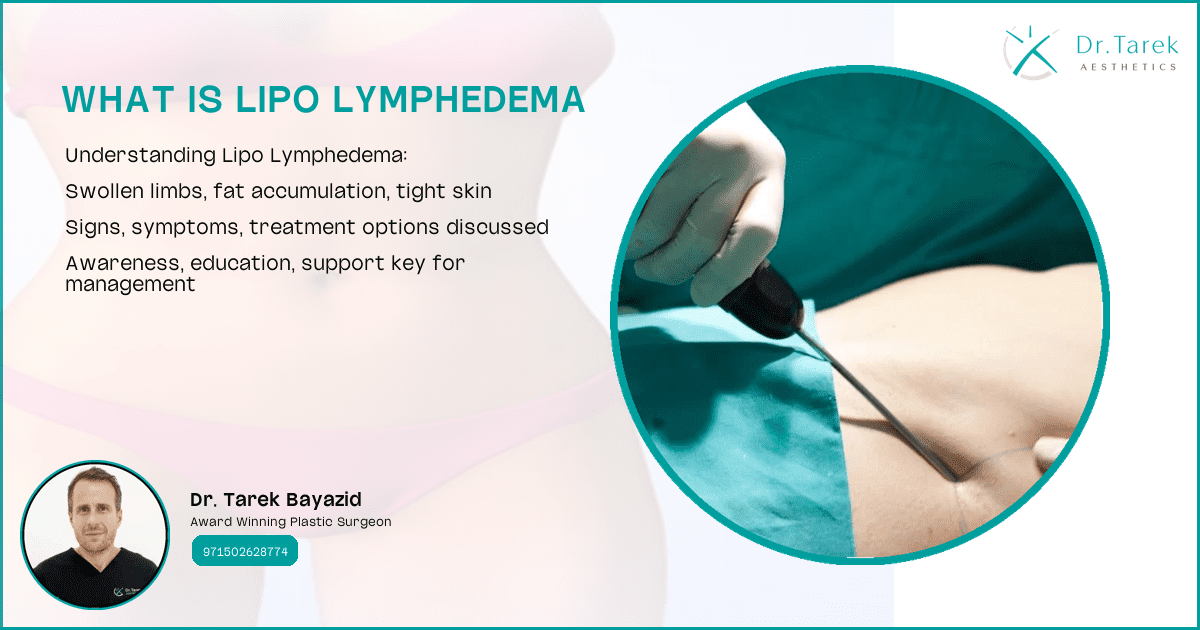What is Lipo Lymphedema
Lymphedema and Its Relationship to Liposuction
Lymphedema is a chronic condition characterized by the accumulation of lymphatic fluid, leading to swelling, usually in the arms or legs. This condition can significantly impact a person’s quality of life, causing discomfort and limiting mobility. Understanding the relationship between lymphedema and liposuction is crucial for those considering surgical options for managing this condition.
What is Lymphedema?
Lymphedema occurs when the lymphatic system is compromised, leading to fluid retention and swelling. This can happen due to genetic factors, surgery, radiation therapy, or infections. The lymphatic system plays a vital role in maintaining fluid balance and immune function, and its disruption can lead to significant health issues.
Causes of Lymphedema
Lymphedema can be primary, resulting from congenital abnormalities, or secondary, caused by damage to the lymphatic system. Common causes include surgical removal of lymph nodes, radiation therapy, and infections. Understanding these causes helps in identifying individuals at risk and implementing preventive measures.
Symptoms and Signs of Lymphedema
The symptoms of lymphedema include swelling, heaviness, restricted range of motion, and recurrent infections. Early detection is crucial for effective management. Recognizing these signs can lead to timely intervention and better outcomes for those affected.
Book A Consultation With Dr Tarek Bayazid
Top-rated Plastic Surgeon For Liposuction in Dubai
Installment Plan Available
- Swelling in limbs
- Feeling of heaviness or tightness
- Restricted movement
- Frequent infections
Can Liposuction Cause Lymphedema
Liposuction is a popular cosmetic procedure aimed at removing excess fat. However, concerns about its potential to cause lymphedema have been raised, especially when performed near lymphatic structures.
Lymphatic System Damage During Liposuction
The lymphatic system is delicate, and any surgical intervention poses a risk of damage. During liposuction, if the lymphatic vessels are compromised, it can lead to fluid accumulation and swelling, characteristic of lymphedema.
Precautions to Minimize Lymphedema Risk
To minimize the risk of developing lymphedema post-liposuction, it is essential to choose a qualified surgeon with experience in the procedure. Preoperative assessments and careful surgical planning can significantly reduce the likelihood of complications.
- Choose an experienced surgeon
- Undergo thorough preoperative assessments
- Follow postoperative care instructions
Can Liposuction Help Lymphedema
While liposuction is often associated with cosmetic enhancements, it can also serve as a therapeutic option for managing lymphedema, particularly in cases where conservative treatments have failed.
Liposuction as a Treatment for Lymphedema
Liposuction can be used to remove excess lymphatic fluid and fatty tissue, providing relief from the symptoms of lymphedema. This approach is particularly beneficial for patients with advanced-stage lymphedema who have not responded to other treatments.
Effectiveness of Liposuction for Lymphedema
Studies have shown that liposuction can effectively reduce swelling and improve the quality of life for lymphedema patients. However, it is not a cure and must be combined with ongoing management strategies, such as compression therapy.
Candidates for Lymphedema Liposuction
Ideal candidates for lymphedema liposuction are those who have not achieved satisfactory results with conservative treatments. A thorough evaluation by a specialist is necessary to determine suitability for the procedure.
- Advanced-stage lymphedema patients
- Those unresponsive to conservative treatments
- Individuals with realistic expectations
Differences Between Lipedema and Lymphedema
While both conditions involve swelling, lipedema is primarily a disorder of fat distribution, whereas lymphedema is related to lymphatic fluid accumulation. Understanding these differences is crucial for accurate diagnosis and treatment planning.
Treatment Options for Lipo Lymphedema
Treatment for lipo lymphedema often involves a combination of liposuction, compression therapy, and lifestyle modifications. A multidisciplinary approach is essential for optimal management of this condition.
- Liposuction
- Compression therapy
- Lifestyle changes
Liposuction Techniques for Lymphedema Treatment
Advancements in liposuction techniques have made it a viable option for lymphedema treatment, with specialized methods offering improved outcomes.
Specialized Liposuction Methods
Techniques such as water-assisted liposuction and tumescent liposuction are specifically designed to minimize trauma to the lymphatic system, reducing the risk of complications.
Postoperative Care and Compression Therapy
Postoperative care is crucial for successful recovery, with compression therapy playing a vital role in maintaining results and preventing recurrence of symptoms.
Expected Outcomes and Recovery
Patients can expect a reduction in swelling and improved mobility following liposuction for lymphedema. Recovery times vary, but adherence to postoperative care instructions is essential for optimal outcomes.
- Water-assisted liposuction
- Tumescent liposuction
- Importance of compression therapy
Alternative Treatments for Lymphedema
For those who may not be suitable candidates for liposuction, alternative treatments for lymphedema are available.
Conservative Management Options
Conservative management options include manual lymphatic drainage, compression garments, and exercise. These approaches aim to reduce swelling and improve lymphatic flow.
Surgical Alternatives to Liposuction
Surgical alternatives to liposuction include lymphaticovenous anastomosis and vascularized lymph node transfer. These procedures aim to restore lymphatic function and reduce symptoms.
Combining Treatments for Optimal Results
Combining different treatment modalities can often yield the best results for lymphedema patients. A personalized treatment plan should be developed in consultation with a healthcare provider.
- Manual lymphatic drainage
- Compression garments
- Lymphaticovenous anastomosis
Choosing a Qualified Surgeon for Lymphedema Liposuction
Selecting a qualified surgeon is crucial for ensuring the safety and success of lymphedema liposuction.
Importance of Specialized Training
Surgeons with specialized training in lymphedema treatment are better equipped to perform liposuction safely and effectively. It is important to verify a surgeon’s credentials and experience.
Questions to Ask Your Surgeon
Before undergoing liposuction, patients should ask their surgeon about their experience, success rates, and postoperative care plans. This information can help in making an informed decision.
Dr Tarek’s Expertise in Lymphedema Treatment
Dr Tarek is renowned for his expertise in lymphedema treatment, offering personalized care and advanced surgical techniques to achieve optimal outcomes for his patients.
- Verify surgeon’s credentials
- Discuss success rates
- Understand postoperative care plans
Latest Research and Advancements in Lymphedema Treatment
Ongoing research and advancements in lymphedema treatment continue to improve outcomes for patients.
Emerging Technologies
Emerging technologies, such as imaging techniques and minimally invasive procedures, are enhancing the diagnosis and treatment of lymphedema.
Clinical Trials and Studies
Clinical trials and studies are essential for evaluating the effectiveness of new treatments and improving existing protocols. Participation in these studies can provide access to cutting-edge therapies.
Future Prospects for Lymphedema Management
The future of lymphedema management looks promising, with ongoing research focused on developing more effective and less invasive treatment options.
- Imaging techniques
- Minimally invasive procedures
- Participation in clinical trials
FAQ’s
How Much Does Lymphedema Liposuction Cost
The cost of lymphedema liposuction varies depending on the extent of the procedure and the surgeon’s expertise. It is important to discuss costs and potential insurance coverage with your healthcare provider.
Can Liposuction Worsen Existing Lymphedema
Liposuction can potentially worsen existing lymphedema if not performed correctly. Choosing a qualified surgeon and following postoperative care instructions are crucial for minimizing risks.
What Are the Success Rates of Liposuction for Lymphedema
Success rates for liposuction in treating lymphedema are generally high, with many patients experiencing significant symptom relief. However, ongoing management is necessary to maintain results.
Is Liposuction Safe for Lymphedema Patients
Liposuction can be safe for lymphedema patients when performed by a qualified surgeon with experience in treating the condition. Proper patient selection and adherence to postoperative care are crucial for minimizing risks.
How Long Does It Take to Recover from Lymphedema Liposuction
Recovery from lymphedema liposuction varies, but most patients can resume normal activities within a few weeks. Full recovery and stabilization of results may take several months, depending on individual factors.
Can Liposuction Cure Advanced Stage Lymphedema
Liposuction is not a cure for advanced-stage lymphedema but can significantly reduce symptoms and improve quality of life. Ongoing management, including compression therapy, is necessary to maintain results.
How Many Liposuction Sessions Are Needed for Lymphedema
The number of liposuction sessions required for lymphedema treatment depends on the severity of the condition and individual patient factors. A personalized treatment plan should be developed in consultation with a specialist.
Can Liposuction Prevent Lymphedema Progression
Liposuction can help manage symptoms and prevent progression of lymphedema when combined with ongoing management strategies. It is not a standalone cure but can be an effective component of a comprehensive treatment plan.ed.











Related Posts